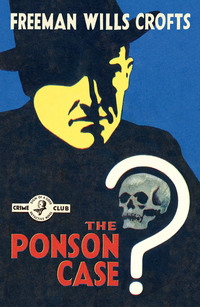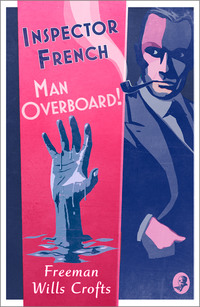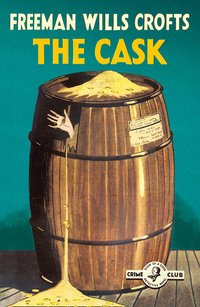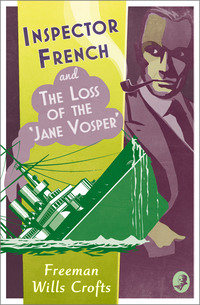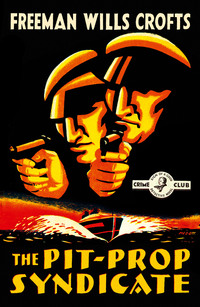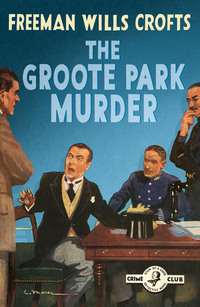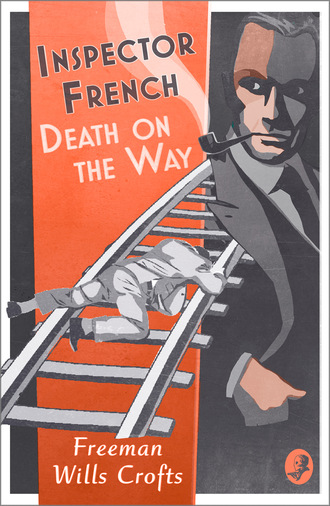
Полная версия
‘The room will be locked, Mr Ackerley,’ went on Clay. ‘No one will be able to enter.’
‘Very well,’ Mr Ackerley returned slowly. ‘I see it can’t be helped. Thank all of you for what you have done.’
Clay began to murmur some words of sympathy, while the sergeant saluted again. Then Clay bent over to Parry.
‘Take him home, Mr Parry. He’s upset from the shock.’
But Mr Ackerley wanted all details, and Parry introduced Bragg and the fireman, though they could not add to what he had himself already stated. No one was able to say how the accident had happened, or how Ackerley came to be where he was found.
In the end Parry went back with the old gentleman. But he did not see Pearl. The ladies were upstairs and could not be disturbed. Mr Ackerley murmured something about his staying for dinner, but Parry excused himself and came away.
When he reached the station he found the sergeant waiting for him. Respectfully the man asked for a statement, and Parry described what had taken place. Bragg had by this time gone on to Lydmouth, and Parry, left alone in Redchurch, took a sharp walk before making his way back to his rooms.
The inquest had been fixed for eleven o’clock on the following morning, and shortly before that hour Parry found himself once more on No. 1 Platform at Redchurch. With him were Mr Ackerley, Bragg, Clay, Driver Blake, Fireman Atkins, and three or four other men. One of the waiting-rooms had been commandeered and the police were busy arranging it for the inquest. A crowd of the curious stood round, staring at everyone concerned.
Mr Ackerley, though still pale and aged-looking, had regained his normal composure and stood talking to a short, middle-aged man with a thin, legal-looking face. This was Mr Loxton, his partner, who apparently was going to appear for him. Talking to Bragg was Hugo Graham, the chief assistant engineer in the Lydmouth office, and the Railway Company’s local solicitor, Mr Kenyon. With the driver and fireman, who seemed somehow incongruous in their best clothes, was a sharp-looking man in gray tweeds. This, Parry knew, was George Thompson, the local representative of the Associated Society of Locomotive Engineers and Firemen.
Clay had been hovering over the group as a hen mothers her chickens. ‘Now, gentlemen, if you please,’ he said at last. ‘The coroner’s waiting.’
A move was made across the platform and the party filed into the waiting-room. It was a large room with a table down the centre and chairs along each side. At the head of the table sat the coroner, Mr Latimer, a local solicitor. The chair next him was kept vacant, but in the second and third places Mr Ackerley and his partner, Loxton, sat down. Then came the Company’s representative, Graham and Kenyon, with Bragg and Parry behind them. Thompson of the A.S.L.E. & F. sat next to Kenyon, with Driver Blake and Fireman Atkins behind him. Beside the fireman was a permanent-way man, Mutch, the ganger of the Whitness length, though what he was there for Parry didn’t know. At the table beyond Thompson were two or three reporters. Clay, after hovering anxiously round, had at last subsided behind Mr Ackerley.
The chairs at the opposite side of the table had been kept vacant, and now Sergeant Hart, the man who had gone out with the special, called the jurors to those places. When they were sworn the coroner glanced round and said that before they proceeded to business he was sure that all present would wish to join with him in tendering to Mr Ackerley and his family their sincere sympathy in this most distressing affair.
Upon this up jumped Mr Kenyon. He said that on behalf of the Railway Company he wished to associate himself with all that the coroner had said, and to add that the Company was anxious to assist the inquiry in every way possible by producing all the evidence available. ‘We have the driver and firemen and several officials here, and if there is anyone else you would like to have present, you, sir,’ he bowed to the coroner, ‘have only to say so.’
Sergeant Hart did not look too well pleased at this calm taking of the credit for what he had done, but he refrained from putting his feelings into words. Thompson then rose and said that on behalf of the men of the Locomotive Department he also wished to associate himself … Mr Ackerley, obviously struggling with emotion, briefly returned thanks and the coroner bowed and said, ‘Horace George Ackerley,’ adding, ‘Don’t trouble, Mr Ackerley, to move. You’re quite all right there.’
Mr Ackerley, sworn, said in a low voice that he had seen the remains and they were those of Ronald George Ackerley, his son. He gave some details of the young man’s career, explaining that for the last four years his work had permitted him to live at home. Ronald was unmarried, and so far as Mr Ackerley knew, was not engaged. Witness had last seen his son at breakfast on the previous morning, and he then seemed in perfect health and in his normal good spirits.
Mr Grahame, the chief assistant engineer, was then called. He corroborated the details of the deceased’s career since he joined the railway staff, adding that since Ackerley had come to the Lydmouth office he had worked steadily and well, and that his appointment as resident engineer in charge of the Whitness Widening was promotion and an outward and visible sign of the confidence which his superiors reposed in him. Deceased had fully justified this confidence, having carried on efficiently since his appointment. So far as Grahame knew, Ackerley had no worries, was keen on his job, got on well with his colleagues and seemed to enjoy his life.
‘Clifford Parry.’
Parry, feeling more nervous than the occasion appeared to warrant, moved forward to the chair beside the coroner and was sworn. Mr Latimer began with a number of general questions, then came to the previous evening.
‘About half past four you and the deceased left your office at Whitness in company and proceeded along the railway in the direction of Redchurch?’
‘That is so.’
‘What was your purpose in doing so?’
‘The inspection of certain works. Mr Ackerley wished to see a slip which was giving trouble at Cannan’s Cutting and also he intended to have an interview with a Mr Potts about a right of way. I wanted to check the measurement of some sea pitching at the Cannan’s Cutting end of Browne’s Bay. We walked together up to this point.’
‘Where did you separate?’
‘At the pitching.’
‘At what hour was that?’
Parry hesitated. ‘It must have been a few minutes past five,’ he said at length. ‘I don’t remember exactly, but I should estimate about ten minutes past five.’
‘Quite so. As a matter of fact another witness will prove it was at twelve minutes past.’
Parry was a little taken aback. He had not known they were overlooked. Then he remembered Mutch, the ganger who had passed just as he and Ackerley separated. This, of course, was what the man had been brought for.
‘Was the deceased in a thoroughly normal condition when you parted?’
‘Absolutely, so far as I know.’
‘What was the last you saw of him?’
‘He was walking on towards Downey’s Point as I began to pace the pitching.’
Mr Latimer took a fresh sheet of paper, making a little pause as if at the end of a chapter.
‘What then did you do?’ he resumed.
‘I paced the dimensions of the pitching and in a few minutes found the error I had been looking for. I walked back then to the office at Whitness.’
‘How long did that take you?’
‘The pacing took seven or eight minutes. It’s a mile back and I took, I suppose, fifteen minutes: probably less, for I ran part of the way. Say, twenty-two or twenty-three minutes altogether.’
‘That would bring it to half past five or twenty-five minutes to six when you reached the office?’
‘It was thirty-three minutes past,’ Parry returned. ‘I noticed the time particularly because I had hurried back so that there would be time to deal with the pitching figures and catch the ballast engine at 5.50.’
‘Quite so. Now, just one other question. Was it dark when you parted with the deceased?’
‘It was dusk, but not dark. I could see to pace the pitching, but I could not read my book without an electric torch.’
The coroner paused. ‘Does any gentleman wish to ask the witness a question?’ he asked presently. No one evincing such a desire, Parry stood back and Bragg was called.
Bragg came forward and took his place on the vacant chair at the coroner’s left hand. In reply to the coroner’s questions he said he was the chief design and executive assistant, under Mr Grahame and immediately above the deceased. Owing to the deceased’s comparative lack of experience of such important works, he Bragg, had been instructed to assist and supervise him to the best of his ability. In accordance with these instructions he visited the works three or four times a week and kept in close touch with their progress.
‘You visited the works yesterday?’ went on Mr Latimer.
Bragg had visited the works. He explained in detail about the four-weekly certificates, stating that it was upon this work, the completion of the current certificate, that he had been engaged on the previous day.
‘Now, Mr Bragg, you have heard the statement of the previous witness that he and the deceased left the office about half past four with the intention of carrying out certain inspections. Did you instruct them to do so?’
Bragg moved uneasily. ‘Yes and no,’ he answered. ‘The interview with the farmer, Mr Potts, had been arranged some time previously in the ordinary course of work. The idea of inspecting the slip on the way was the deceased’s, but he set out to do both of these things with my knowledge and approval. I definitely instructed the last witness to check the pitching, but so long as it was done that day I left the time of doing it to himself. From what he said, I think he chose the time in order to have the deceased’s company so far.’
‘I follow. Now, Mr Bragg, you say that you told the deceased to meet you here in Redchurch on the arrival of the ballast engine. At what hour should that have been?’
‘A minute or two before six.’
‘Very well. Now, if the deceased parted from Mr Parry at the point where this pitching was measured at 5.12, as we shall prove, and was due in Redchurch about six, at what hour should he have passed the place at which the accident occurred?’
‘Downey’s Point? It was seven or eight minutes walk from the pitching. About 5.20, I should say.’
‘At what hour did your engine pass Downey’s Point?’
‘About 5.55.’
‘That’s what I’ve been coming to. How do you account, Mr Bragg, for the deceased not having been farther on when the engine came?’
‘I can’t account for it at all. That was one of the things which overwhelmed me with surprise, that he was there when he should have been at Redchurch.’
That ended the examination and Mr Kenyon took advantage of the coroner’s invitation to ask a question.
‘Tell me, Mr Bragg,’ he said, ‘was it quite a normal thing for you to arrange with the deceased to walk over the Widening?’
‘Absolutely normal. We were doing it every day. It was part of the deceased’s duty.’
‘Quite so. But what about walking the line in the dusk or dark?’
Bragg shrugged. ‘That was not so pleasant, of course, but at this time of year one can’t help oneself.’
‘I don’t mean that, Mr Bragg. I mean, was it usual and was it safe?’
‘It was both,’ Bragg returned firmly. ‘Besides you will remember that last evening was not dark. There was a moon behind the clouds.’
‘There was no reasonable fear of the deceased meeting with an accident?’
‘None, I think. He was thoroughly experienced and knew every inch of the way, and he could easily see where he was.’
Mr Kenyon intimated that that was all he wanted and sat down.
Mr William Potts deposed that he was a farmer living some half a mile on the Redchurch side of Downey’s Point. He had had a business appointment with the deceased for half past five on the previous evening. He had duly come down to the railway, but after waiting till after six had assumed the deceased had been detained, and had returned home.
Driver Blake was the next witness. After giving evidence about the fatal run of the ballast engine, he was questioned in detail as to the conditions obtaining on the footplate just before the accident. He was standing in his place, looking out ahead. Mr Parry was standing behind him. Mr Bragg was seated on the fireman’s seat and the fireman was occupied with the fire. No, there was no talking going on, and all concerned were carrying out their duties carefully and normally. He did not see anyone on the line. He could not do so because of the curve. The first intimation he had that anything was wrong was a shout from the fireman, and he stopped as soon as it was physically possible.
Fireman Atkins corroborated the driver’s evidence. The fire was low and wanted raking up and he did this work as they approached Downey’s Point. When he had finished he stepped to the side of the cab and looked out ahead. He had no special reason for doing this. It was merely a precautionary measure, as he knew the driver’s view would be bad. When he had looked out a moment he saw something black on the line. He shouted to the driver, who immediately stopped. He went back and found they had run over Mr Ackerley.
‘When you saw this black object,’ resumed Mr Latimer, ‘did you know it was a man?’
‘No, I didn’t know what it was. But whatever it was I knew we should stop.’
‘Quite so. Now, where exactly was the object?’
‘Just about halfway round the curve.’
‘I don’t mean that. Was it between the rails or across the rails or outside them?’
‘As far as I could see, it was lying across the low leg.’
‘What do you mean by the “low leg”?’
‘The inside rail.’
‘That is the right hand rail because the curve was turning to the right?’
‘That’s correct.’
‘Can you swear he wasn’t standing up?’
The fireman didn’t think so, but he wouldn’t swear to it. He had seen Ackerley as a dark mass and in the gloom he was not sure in what position the unhappy young man had been.
‘Now,’ Mr Latimer went on, ‘after the engine had passed was the position of deceased altered?’
Of this there was no doubt. The engine had struck the body and carried it along, leaving it between the rails. The right arm had been severed and it lay outside the right hand rail.
‘Did you examine the engine afterwards?’
It appeared that there were bloodstains on the right life guard and leading bogie wheel. It was clear, therefore, that the accident had occurred with the ballast engine and not with some previous train.
On the coroner giving the usual invitation, Mr Thompson of the A. S. L. E. & F. sprang up.
‘With regard to the lookout that was kept from the engine can you say that this was adequate?’
The witness was positive that it was entirely adequate.
‘As good and complete as is ever kept?’
‘Yes, quite up to the normal.’
‘As a matter of fact, could you under any circumstances have seen the deceased sooner than you did?’
‘Not except in daylight.’
Mr Clay was then questioned as to the hour at which the previous trains had passed Downey’s Point. It appeared that one left Redchurch at 5.0 and stopped specially at Downey’s Point to pick up the workmen, reaching Whitness at 5.10. It there crossed a train from Bournemouth, which left Whitness at 5.10 and arrived at Redchurch at 5.16. There was no other ordinary train then till the 6.10 from Whitness. On the previous evening there had been no special except the ballast engine leaving Whitness at 5.50.
Permanent Way Ganger Mutch was next called. He stated that while walking home on the previous evening, at the pitching between Browne’s Bay and Cannan’s Cutting he had passed Mr Ackerley and Mr Parry. They were just separating. As he went on he happened to glance back and he saw Mr Ackerley walking towards Downey’s Point and Mr Parry stepping off the line down over the pitching on the sea slope.
‘At what hour did they part, Mutch?’ the coroner inquired.
‘About 5.12.’
‘Now, will you just tell the jury how you happen to know that so well?’
‘I know it by the 5.10 from Whitness,’ the man returned. ‘She passed about a minute after they parted. That would be about 5.13 or 5.14 at the outside.’
‘It has been estimated, ganger,’ said the coroner, ‘that the deceased must have reached the point at which he was killed at about 5.20. You know the place and you saw the speed at which he was walking. Do you agree with that estimate?’
Mutch thought it would be about right.
‘Would it have been possible for him to have been killed by that 5.10 from Whitness of which you speak?’
About this the ganger was positive. It would have been utterly impossible for the distance to have been covered in the time.
‘Then he wasn’t killed until 5.55. Can you suggest what he might have been doing in the interval?’
Mutch had no idea and was allowed to leave the witness chair. Sergeant Hart bent down.
‘I think, sir,’ he said confidentially, ‘that I can put forward a theory to account for this. It is, of course, only a theory.’
The coroner nodded. ‘Very good, sergeant, we’ll hear it in due course.’
Dr Cripps, the police surgeon, testified that he had examined the remains. He described the injuries till Parry felt sick. The face was slightly disfigured from contact with the stone ballast and there had been a blow on the right side of the head behind the temple, fracturing the skull. This was probably due to the deceased falling against the rail, as the skin was but slightly damaged. The right arm had been severed. In the doctor’s opinion these injuries were consistant with the deceased having fallen and having been run over by a railway engine. Death had been instantaneous.
Sergeant Hart was the last witness. He deposed that he had accompanied the engine and van out to Downey’s Point on the previous evening, when the remains were being brought in. He had examined the line with a torch and from the marks on the ballast he believed he had been able to reconstruct the tragedy. Firstly, he was of opinion from the nature of the injuries that the deceased had been lying across the rail before the engine approached. Just behind where the young man’s foot would have come was a cross drain, due to the workings, where the ballast had been sunk between two adjacent sleepers to a depth of nine or ten inches. It appeared to the witness that the deceased might in the dusk have slipped into this drain and fallen, striking the side of his head on the rail and being stunned. This, of course, was only the witness’ theory and he had been unable to obtain actual proof of its truth.
This being all the evidence, there was a short pause while the coroner adjusted his notes. Then he made a summary of what had been stated, very clearly and fairly, as Parry thought. Finally he gave a short exposition of his own views.
‘I do not think, members of the jury,’ he ended up, ‘that you will have much difficulty in reaching a verdict in this unhappy affair. You may consider that this unfortunate young man lost his life as the result of an accident, for which neither he nor anyone else was to blame. If you do so you will return a verdict of accidental death. On the other hand, if you are not satisfied with this view, you will consider the alternatives. There are only two; suicide and murder.
‘Now, with regard to suicide, the whole of the evidence tends to show that the deceased was in good health, bodily and mentally; that he was happy in his work and with his associates; that he was ambitious and working hard for advancement and success; and that he was free from pecuniary embarrassment and from unhappy love entanglements: in fact, he had every reason to live and none to die. In the face of this evidence, the theory of suicide seems to me to present grave difficulties.
‘There is one piece of evidence, however, which might at first sight be held to support the theory of suicide: that the deceased must have been for a considerable time, about half an hour, at or near the point at which he was killed. It might here be argued that he was waiting for the engine in order to throw himself before it. Sergeant Hart, however, has put forward a theory to account for this delay, which you may consider adequate. There was a drain across the line; in the dark the deceased did not see it; he put his foot into it, tripped over the next sleeper and fell forward, striking his head on the rail and becoming insensible. There at all events you have what might have happened. That it did happen cannot be proved, but still less can it be disapproved.
‘But if the evidence for suicide is unsatisfactory, I think you must agree that no evidence has been given which in any shape or form suggests that murder has been committed. I do not think I need labour this point.
‘Now, members of the jury, I would ask you to retire and consider your verdict, and if there is any point in which I can assist you in your labours, I shall be glad to deal with it to the best of my ability.’
The jurors, looking important, whispered among themselves. Then the foreman, standing up, said that the members didn’t require to retire to consider their verdict, that their minds were made up, and that they found that deceased had met his death through an accident and that no blame attached to any person therefore.
4
Enter Inspector French
Early on the morning of the day after the inquest on Ronald Ackerley Superintendent Rhode and Inspector Dawe of the Redchurch police were seated in the former’s office in the police station of that town. Two men less alike in personal appearance than the superintendent and his assistant it would not have been easy to find. Rhode was a big heavily built man with a domineering expression and a curt manner. Dawe on the other hand was thin and nervous looking and seemed chronically ill at ease. Rhode reached his results by sheer driving force which refused to recognise any obstacle, Dawe by his alert mentality. Both were good men, respected by each other and by their superiors.
They were not discussing the inquest. They were not interested in the inquest except to load it with imprecations for having occupied a day of Sergeant Hart’s time, a day which both they and he had been very reluctant to spare. For the Redchurch police force was at the moment working at high pressure. No less than three serious crimes, a murder and two burglaries, had recently occurred in that usually peaceful area, and these were proving just a little more than the staff could handle with comfort. In fact, the calling in of the Yard to help with the murder case was under consideration.
This was indeed the point on which Rhode and Dawe were now engaged. They were about to draw up a report to their chief constable, giving a considered opinion for or against applying to London. Dawe was against it, Rhode on the whole in favour of it, but willing to be convinced.
‘If we could get a line on Farjeon,’ Dawe was saying, ‘we could get ahead. That’s what’s holding us up.’
‘A week’s work of far more men than we can spare has gone into it already,’ Rhode answered, ‘and we don’t seem much further on. If we could have got those men on to the burglaries we’d probably have had them squared by this time. I’m afraid, Dawe, if we don’t do better by tomorrow or next day we’ll have to get help.’
Dawe’s reply was cut short by a knock at the door. A constable put in his head.
‘Coastguard Wilmot of the Whitness station is here, sir, and would like to see you about the death of Mr Ronald Ackerley.’
Rhode and Dawe exchanged glances. ‘Good Lord,’ said the former, ‘more trouble. Show him in, Braithwaite.’
Wilmot proved to be an elderly and intelligent looking man bearing the obvious stamp of the Royal Navy. He wished the officers good morning and took the chair to which Rhode pointed.


